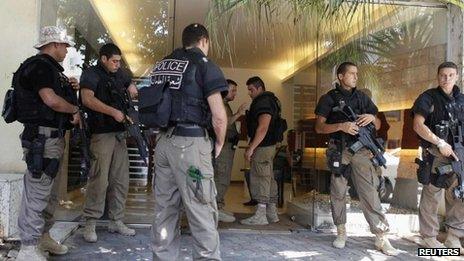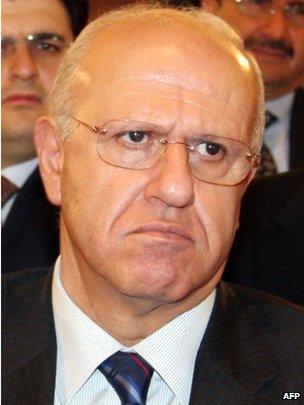Syria crisis: Lebanese detention highlights faultlines
- Published

Michel Samaha's arrest is seen as highly unusual, given Lebanon's current government which is sympathetic to Syria's President Assad
The detention of a well-known Lebanese political figure, Michel Samaha, has underlined the explosive potential of the Syrian crisis and how it stretches into the heart of Lebanese politics.
Mr Samaha, a former information minister and member of parliament, was escorted from his home in the hills near Beirut by security forces early on Thursday morning.
He is known for his strong ties with the Syrian regime and with President Bashar al-Assad personally.
He is reported to have been detained by personnel from the Information [intelligence] Branch of General Security on instructions from the acting public prosecutor.
That security branch has the reputation of being loyal to the staunchly anti-Syrian "March 14th" faction, headed by Saad al-Hariri, former prime minister and son of the assassinated Sunni leader Rafiq al-Hariri, also a former prime minister.
That such a detention should take place under the current Lebanese government was seen as highly unusual.
The government excludes the March 14th coalition, is backed by Hezbollah, and includes Syria's allies in Lebanon.

Reaction to Mr Samaha's detention has been muted
Assassination threats
Current Prime Minister Najib Miqati was quoted as saying that the detention was security-related but had nothing to do either with the locally-controversial international tribunal on the Hariri assassination, or the possibility of his being an Israeli agent.
It is believed that Mr Samaha is being questioned in connection with efforts to destabilise the country through bomb explosions and assassination attempts.
The anti-Syrian Christian leader Samir Geagea, whose now-dissolved Lebanese Forces used to be one of the main fighting factions in civil war days, was the target of an apparent would-be assassination in April which failed.
Several other anti-Syrian figures have said they have information that they are under threat of assassination on Syria's behalf.
Michel Samaha used to belong to the largely Maronite Christian Phalangist Party, of which Mr Geagea's Lebanese Forces were an offshoot.
But both the Phalangist Party and the Lebanese Forces are now firmly in the anti-Syrian camp, while Mr Samaha has retained his friendship and ties with the Syrian regime.
That means he has no immediate personal political power base, which is one reason why reaction to his detention has been relatively muted.
The implication of the reaction that there has been, is that there must be some kind of evidence that merits investigation.
Prime Minister Miqati, a Sunni regarded as generally sympathetic to Syria without being in thrall to it, was quoted as saying that he knew beforehand about the impending detention, and that the outcome of the investigation should be awaited.
'Political' step
The reaction of Hezbollah itself, a close ally of Damascus, was also low-key.
Given Mr Samaha's prominent profile, some observers believed it likely that the President, Michel Suleiman, who is also a Maronite Christian and is seen as a fairly neutral figure, would also have known about the impending move.
But there was considerable shock about the manner in which his detention was conducted, with security forces raiding his house at 07:30 local time (04:30 GMT) and dragging him from his bed.
He was taken away swiftly, but agents then spent several hours combing through his house.
His family, and pro-Syrian political allies, have charged that the step is blatantly political.
Much will clearly depend on what results the investigation by the public prosecutor's office produces.
Despite the fault-line running through Lebanese politics from across the Syrian border, and the obvious potential for serious trouble, the situation has so far remained relatively contained.
Above all, Hezbollah, by far the most powerful faction in the country, has shown no sign of spoiling for a fight in the domestic arena, as it watches its allies in the Syrian regime struggling for survival.